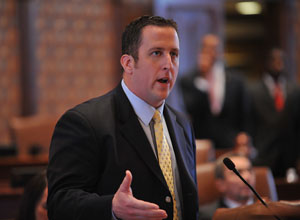- Details
- Category: Press Releases
 SPRINGFIELD – A plan to ensure students are properly trained to administer cardiopulmonary resuscitation (CPR) and to operate an automated external defibrillator (AED) received approval by lawmakers earlier this week. House Bill 3724 would add both CPR and defibrillator training to the health education curricula for high school students.
SPRINGFIELD – A plan to ensure students are properly trained to administer cardiopulmonary resuscitation (CPR) and to operate an automated external defibrillator (AED) received approval by lawmakers earlier this week. House Bill 3724 would add both CPR and defibrillator training to the health education curricula for high school students.
Area lawmaker State Senator Michael Hastings (D–Tinley Park) sponsored the initiative.
“In too many schools, the only person properly trained to administer this life saving procedure is the school nurse, who may be unavailable in a crisis situation,” Hastings said. “This will proposal will ensure that all students are properly trained to assist their peers in a case of an emergency.”
The bill does give parents the option to exempt their kids from the training.
House Bill 3724 passed both chambers and now awaits the governor’s signature.
- Details
- Category: Press Releases
 SPRINGFIELD – The state Senate this week approved a new state lottery game to support mental health and substance abuse programs.
SPRINGFIELD – The state Senate this week approved a new state lottery game to support mental health and substance abuse programs.
The measure would create the “Ticket for Recovery” scratch-off lottery game. Its proceeds would fund programs that support people living with mental illness and addiction.
“Mental illness and addiction should be treated as the public health problems they are, rather than as a source of shame and stigmatization,” said Senator Michael Hastings (D-Tinley Park), who co-sponsored the measure.
The proposal (SB 218) now goes to the House of Representatives for consideration.
- Details
- Category: Press Releases
 SPRINGFIELD – At-risk youth and veterans could find themselves working to restore and preserve Illinois’ parklands, under a plan the state Senate approved last Wednesday.
SPRINGFIELD – At-risk youth and veterans could find themselves working to restore and preserve Illinois’ parklands, under a plan the state Senate approved last Wednesday.
The measure, co-sponsored by Senator Michael Hastings (D–Tinley Park), would create the Illinois Young Adult Recreation Corps. Through the Corps, eligible at-risk youth and veterans would be hired to work on preservation projects and park restoration throughout the state.
“This program will provide a positive work environment for struggling youth as well as create good-paying jobs for our veterans returning from service,” Hastings said. “They will be able to develop valuable professional skills while doing meaningful work protecting and enhancing the natural beauty of our state.”
The measure (SB 3521) now moves to the House for consideration.
- Details
- Category: Press Releases
 TINLEY PARK – State Senator Michael Hastings (D–Tinley Park) met with Tinley Park Village officials on Tuesday to announce an investment of $200,000 to install a new traffic signal at Timber Drive and 80th Avenue near the Metra line. The investment was funded by the Illinois Jobs Now! plan, a $31 billion construction program initiated by lawmakers in 2009 to support new and existing infrastructure projects across the state.
TINLEY PARK – State Senator Michael Hastings (D–Tinley Park) met with Tinley Park Village officials on Tuesday to announce an investment of $200,000 to install a new traffic signal at Timber Drive and 80th Avenue near the Metra line. The investment was funded by the Illinois Jobs Now! plan, a $31 billion construction program initiated by lawmakers in 2009 to support new and existing infrastructure projects across the state.
“Installing this traffic signal has been a major priority for the Village and I’m extremely pleased that we were able to work with state officials to get this grant approved,” Hastings said. “Anyone who lives in Tinley Park knows that traffic is congested after the train lets out. It will allow for better traffic flow at peak hours and eliminate the need for police to direct traffic.”
The traffic light will be installed at one of the busier intersections in the Village. Currently, the Village spends nearly $25,000 for traffic detail at the corner during peak rush hours because of safety concerns.
“My top priority is to find funding to invest and develop our area,” Hastings said. “The traffic light will not only make it safer for drivers and pedestrians, but it will also save the Village money.”
More Articles …
Page 79 of 88


